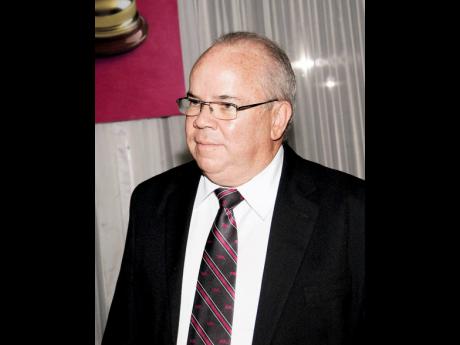Croskery blocked from using $480m villa to settle debt
The Supreme Court has blocked founder of the fraud-hit Stocks and Securities Limited (SSL), Hugh Croskery, from using a $480-million villa in St Ann to settle a debt with George Chai, a retired bakery owner. Any transfer of the property will have...
The Supreme Court has blocked founder of the fraud-hit Stocks and Securities Limited (SSL), Hugh Croskery, from using a $480-million villa in St Ann to settle a debt with George Chai, a retired bakery owner.
Any transfer of the property will have to wait until the trial of a claim brought by family-owned Coral Cove Management Limited (CCML), according to a July ruling by Justice Stephane Jackson-Haisley.
The court not only halted the transfer, but has blocked the defendants from entering or interfering with the property and the Registrar of Titles from registering any interest in the property.
Croskery used the villa at Discovery Bay and his house in Norbrook, St Andrew, to secure a US$1-million loan from Chai in 2014. But he ran into repayment problems and was hoping to pay off the debt with the luxury villa.
CCML, through its directors and siblings Heidi Clarke and Bruce Lopez, is claiming that Croskery breached a 1998 agreement giving it a right of first refusal (ROFR) if the property is to be sold or transferred. An ROFR is typically found in contracts that give the holder the right to enter into a business transaction with a person or company before anyone else can.
CCML owns a property neighbouring the one that Croskery is seeking to transfer. The properties have separate titles but are not separated by boundaries. The parties are relatives.
Lopez has argued that the two properties share a small cove “which would be impractical to separate” and that because of the layout, “shared use of the land and amenities allows for better enjoyment of either property”. He said they inherited the properties from their parents, whose ashes were sprinkled in the cove.
In his defence, Croskery argued that in December 2022, he had a frank and confidential meeting with Lopez regarding his finances and the debt to Chai, which he said needed to be settled urgently.
He claimed that he made a verbal offer to sell the subject property to CCML for US$3 million and gave the siblings 10-12 days to decide, but that Lopez was unable to find a buyer.
Refurbishing works started
Croskery also indicated that he signed an instrument of transfer in November 2022 that was given to Chai, who later took possession of the villa and started refurbishing works in the kitchen and bathroom. It was not registered before CCML sued.
Lopez disputed the claim of an offer, insisting that the agreement required an offer in writing and up to 30 days for a decision.
He said before he met with Croskery in December, he had reached out to him after hearing rumours that SSL was in financial trouble. He said Croskery suggested that the price tag for the property was US$5 million, but he did not take it seriously.
The siblings have indicated that they are prepared to buy the property for $225 million. A March 2023 valuation put the property at US$3.2 million (J$480 million).
Croskery’s daughter, Sarah Meany, a defendant, also told the court that she attended a meeting in June 2022 that dealt with monies owed by SSL and her father to Chai. She said she pointed to the right of first refusal to Lopez and Clarke but that it was met with disregard and rejection. His son, Mark, is also a defendant.
Siblings Mark Chin and Christina Chin, Chai’s nephew and niece, are also defendants with Chai. Christina said up to the signing of the transfer document, the ROFR was not disclosed and that the Chai team was aware that the value of the property was below the loan amount. She said they were banking on the income-earning potential of the villa to fill the gap.
Jackson-Haisley said there were serious issues to be tried, such as whether Croskery’s verbal sale offer was in compliance with the 1998 agreement, and whether the mortgaging of the property to settle the debt takes priority over the ROFR.
She also said, based on the available evidence, “it appears uncontroversial that the ROFR has been breached” by Croskery.
The judge said an undertaking to pay damages by the defendants, should they end up losing the case, is not sufficient since CCML has argued that the property is more than about money to them.
“Were the injunction not granted, the claimant would lose forever a valued family heirloom which could not be remedied by an award of damages. This outweighs any prejudice the defendants may suffer in having to await the determination of the matter to recover any financial loss,” she ruled.
CCML’s case was led by Stephanie Ewbank (partner), Matthew Royal and Jacob Phillips of Myers, Fletcher & Gordon. They were instructed by Bruce Levy of Levy Cheeks.
Law firms Bunny & Steer, Henlin Gibson Henlin, Barbican Law Clinic and Wong-Ken & Co led arguments for the defendants.

